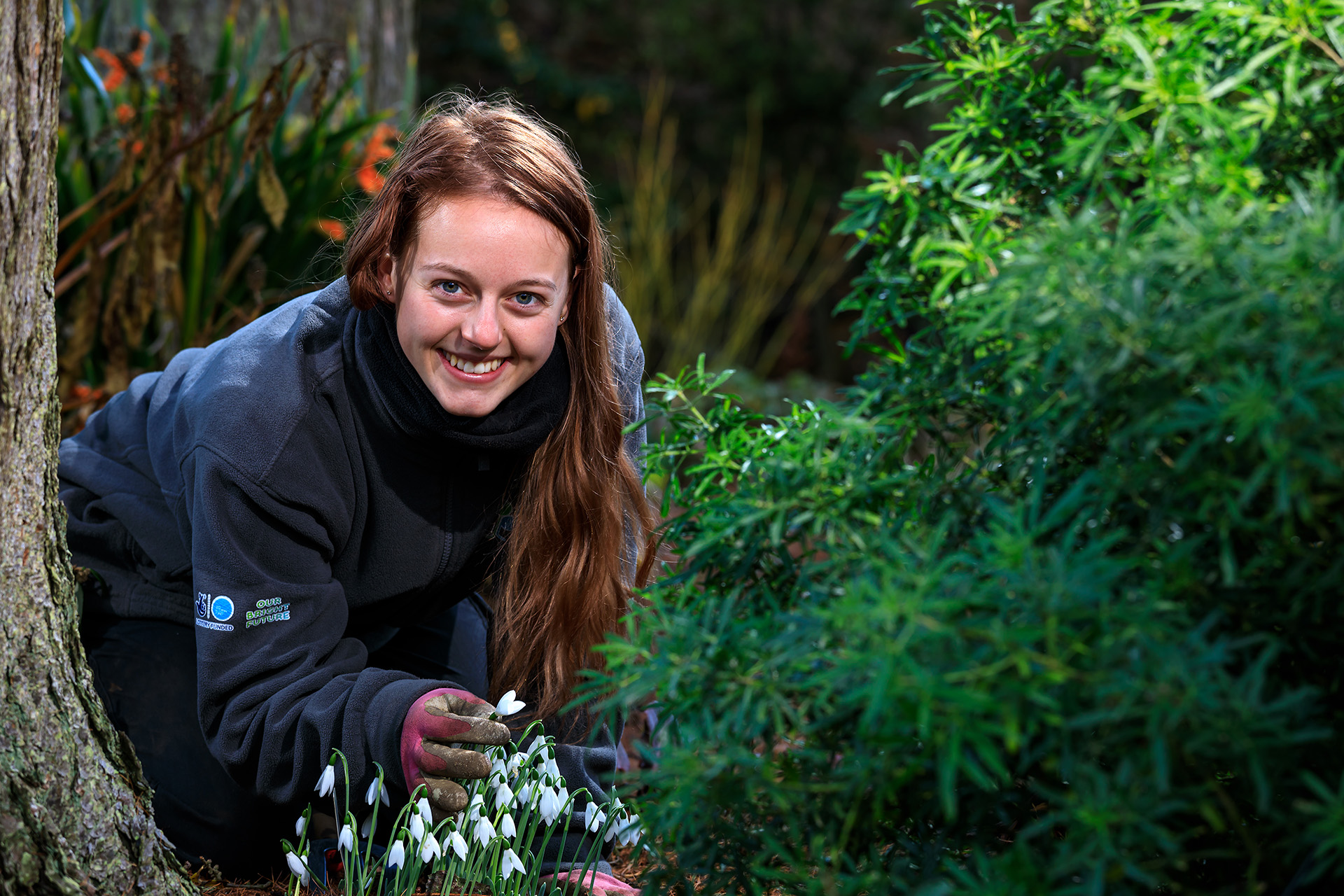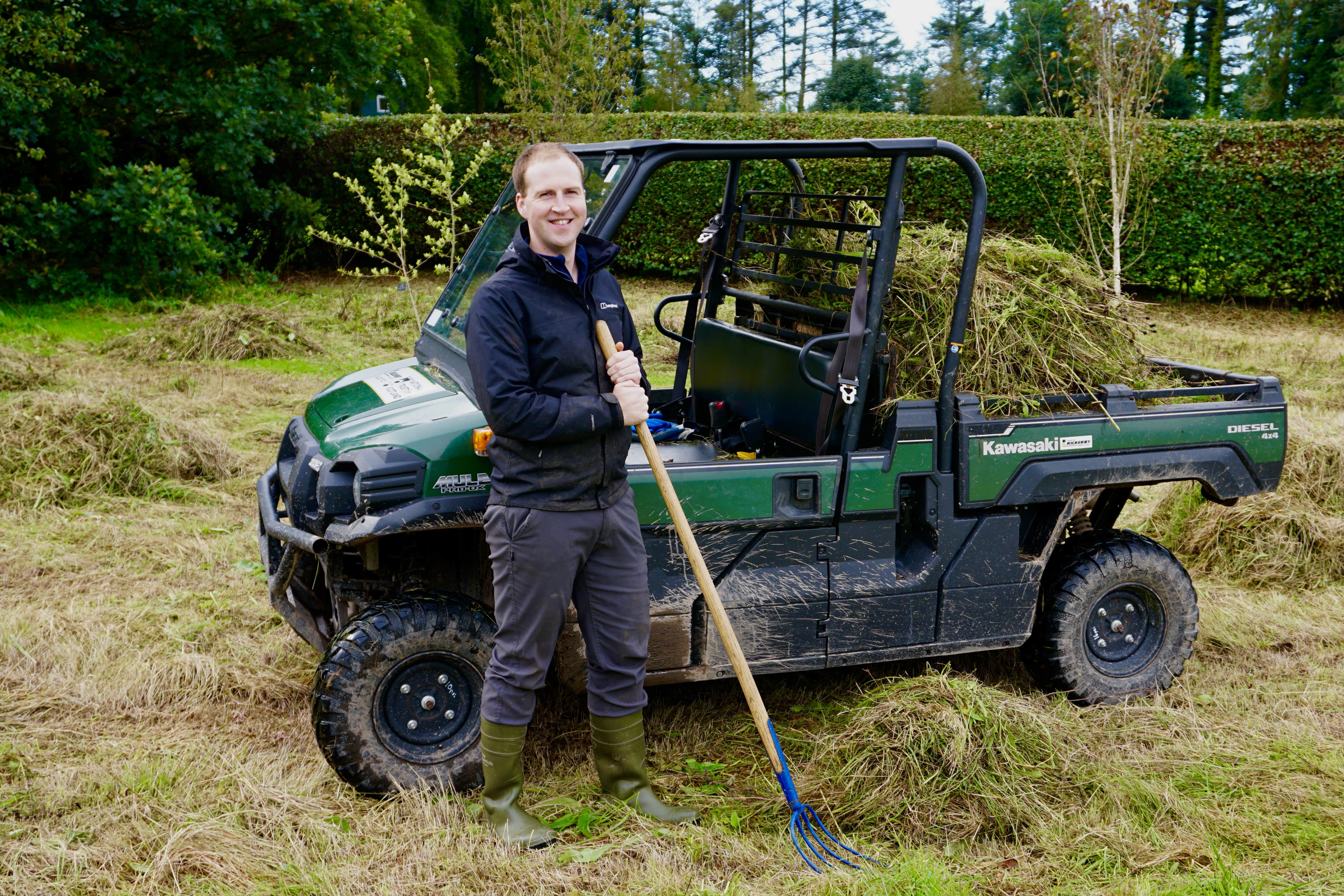

A Myerscough College Sports Turf apprentice was become the first in the country to achieve a distinction level grade under the Sports Turf Operative Apprenticeship Standard.
Luke Weston, who has been undertaking an apprenticeship while working as part of Magdalen College School ground staff in Oxford, achieved the highest possible grade under the new system, introduced just a few years ago. He said:
“It was quite daunting to be the first learner to undergo the end point assessment process. My tutor Simon Dadge and my employer gave me tons of support to make sure I was ready for the day."
“To achieve a distinction is something I am extremely proud of. My advice to other apprentices is to be confident and to make sure you practice. I would also say to only agree to the end point assessment when you know you are ready, and your employer and tutor agree.”
The Apprenticeship Standards are written by the industry, for the industry. The Apprenticeship Standard includes an assessment plan produced by ‘trailblazers’, who are employer-led groups developing the standards, to make the apprentice truly industry ready at the end of their training.
The Apprenticeship Standards are designed to support and guide the apprentice through their work-based learning journey with constructive appraisals, the development of practical skills and knowledge, relevant competency-based qualifications, all complemented by off the job training designed to widen their industry experience.
The final stage of the apprenticeship is an End Point Assessment (EPA), which in Luke’s case was carried out by Lantra.
Taken from an article written by Dave Salmon
When Lucia came to the UK from Austria, little did she know that in just a few years her budding horticulture career would take her to the Royal Botanic Garden in Edinburgh while studying for a higher-level qualification. Lucia has achieved a great deal in a short time, and it all started with a love of gardening as a child.
Lucia said: “Gardening’s been a part of my life for as long as I can remember – there’s something about the colour and shape of flowers that really appeals to me. I remember helping my mum when I was tiny. She’s a keen hobby gardener and I would spend many happy hours pruning, digging and planting with her. It was great to be outdoors, but I didn’t think for one minute I’d do this for a career.”
After leaving school with no desire to go to university or get a desk job, Lucia wanted to explore career options that would satisfy her desire to work outdoors, so she came to the UK. Soon after arriving in Scotland, she managed to secure a volunteering job at Cambo Gardens near Kingsbarns in East Fife.
Lucia said: “Cambo was a fantastic platform for a horticulture career. Not only is it stunningly beautiful, but the support and training there is excellent. After volunteering, I did my NC in Horticulture, followed by a Modern Apprenticeship through ‘Our Bright Future,’ a lottery funded scheme to help young people gain valuable skills and experience. The Modern Apprenticeship combines practical skills work with theory, with course work managed through SRUC. It’s a great way to get hands-on, practical experience that’s relevant to your job. There’s nothing else like it really.”
Our Bright Future also provided funding towards other training courses, including brush cutting, health and safety, chainsaw work and felling. Lucia also had the chance to meet MPs, which she reflects upon with pride. She said: “I was honoured to be one of two people picked to represent the horticulture industry and voice our opinions to MPs in the Houses of Parliament as part of the Our Bright Future initiative.
We each had bring one issue to the table and mine was the lack of rural education in schools – the focus seems to be all about going to university and securing an office job, with little attention given to land based careers. We felt kids need to get away from screens and have more time outdoors. Our local MP seemed really interested to hear what we had to say.”
After completing her apprenticeship at Cambo, Lucia moved to Edinburgh where she is currently studying for an HNC in Horticulture with Plantmanship, delivered through SRUC and the Royal Botanic Garden Edinburgh. The course enables trainees to learn many of the practical skills required to work in a public or estate garden by shadowing specialist teams in rotations of five days.
Lucia explains. “The rotations are really useful because they give you a taster of so many different aspects of garden horticulture. For example, we worked alongside the art team at the Botanics, planting shrubs, transplanting trees and getting involved with general maintenance. The second rotation introduced us to the famous glasshouses, where we got paired with gardeners and got stuck into pruning and tending to the waterlilies. The third rotation was with the rock and wood teams working in the woodland and alpine garden, and the last will be the herbaceous team looking after vascular plants.”
So what does the future hold for such a promising young horticulturist?
“To be honest I’m keeping my options open. There are more opportunities in the UK than in Austria, as the garden culture is very different and horticulture isn’t such a big industry over there. Once I’ve finished my HNC, I’d like to go on and do an HND then possibly a degree, but for now I’m happy to keep on gaining experience and improving my skills.”


29-year-old Tim Buchan from Forfar in Angus has always had a love of the outdoors, but his initial career took him in a different direction. He studied international hospitality management then did a master’s degree in digital marketing, before going on to work in retail and hospitality for several years.
As someone who was brought up in the country with strong family connections in agriculture, Tim felt he was in the wrong place, but opportunity soon came knocking. It started when he found out about a trainee post being available with Trees for Life, part of Scotland’s Skills for Rewilding Project. Supported by the Heritage Lottery Fund, this initiative aims to develop rural skills within the community and re-establish wild areas and natural habitats across Scotland.
Tim said: “When I saw the advert, I knew this was what I was looking for. Trees for Life were offering a role as a nursery trainee at their flagship rewilding estate at Dundreggan near Fort Augustus, and after a 12-month course I would graduate with an SVQ 2 in horticulture. I applied immediately and was delighted to get accepted.”
While working at Trees for Life, Tim built up his skills in commercial horticulture, tree propagation and planting. Trees for Life is working to rewild the Scottish Highlands and restore the Caledonian Forest. Although it once covered a large area of the Highlands with Scots pine, birch, rowan, juniper and aspen trees, it is now just 2% of its former size. Through planting native tree species, removing non-native species and fencing seedlings, Trees for Life aims to help the natural regeneration of the forest. Tim became involved in all aspects of propagation at the nursery, from seed collecting, preparation, storage, germination and growing through to planting in the wild.
Tim said: “I felt what we were doing was really significant – we were helping to grow and develop the species that are needed in our wild areas. It was very satisfying and my time at Trees for Life really helped spark my passion for plant propagation and husbandry.”
As his training with Trees for Life came to an end and Tim was searching for a new position, he was delighted to see an advert for The National Trust for Scotland’s School of Heritage Gardening at Threave Garden, Dumfries & Galloway.
Although Threave specialises in ornamental gardening, which is a world away from the commercial work Tim had been doing, his passion for gardening meant this was a perfect opportunity and he applied to join the 12-month course.
Tim said: “I was really happy when I got onto the Threave course. They have a great set up with glass houses, a walled garden and grounds, so you can pick up a broad range of horticulture skills over a short period of time. I ended up with a level 2 and 3 qualification from the Royal Horticultural Society, which covers plant propagation across three climate zones in the glass houses, working in the walled garden on fruit and vegetable production and in the greater grounds where there’s lots of pruning, planting out and establishing new beds. There was some theory about things like plant identification, but much of it was out doing the work, keeping diaries, writing up reports and working in the various areas of the Threave estate. It has been a great experience and really set me up for life.”
While doing his studies at Threave, the Covid-19 pandemic hit, which presented many challenges to him and his fellow students. Tim explains:
“When the lockdown started back in March 2020, we had to cut our team by half, so we were looking after the garden with a skeleton team. Luckily, all the students were living together on site, so technically we were in a bubble and didn’t need to socially distance. Lockdown was a time to keep the garden ticking over rather than starting any significant projects that demand manpower. It was a tough time for Threave financially because they could no longer promote the garden at local shows.
Our training was also impacted because some of the instructors had to self-isolate, but in some ways we learnt more because we had to get on with things ourselves. We were given more responsibility sooner and this gave us confidence and self-belief. So, despite the challenges, it wasn’t all bad.”
With a couple of years now under his belt, Tim has some sound advice for budding horticulturalists.
He said: “I think the crucial thing is a willingness to learn and having a genuine enthusiasm in what you do. A love of working outdoors is important and you shouldn’t be afraid to take the first step. Doing something new or different is always tough, but once you start, its much easier. Finally, I’d say having some volunteering experience before you apply is really helpful. It shows your interest and willingness to gain unpaid experience.”
Tim doesn’t have any firm plans for the future yet, except to continue to build upon his growing experience.
He said: “I have so much to learn and I’m really happy with my role at Threave, which is a great place to learn your trade. I will hopefully go on and get some tickets in chainsaw operation, tractor driving, spraying, health and safety and other areas, as well as build my experience in all areas of plant propagation, which is my passion. As far as the future is concerned, I have a real admiration for the work that The National Trust for Scotland do. They have a big impact on the management of many of our public gardens and outdoor spaces and offer many specialist course in plant management, so maybe that’s something to consider. For now, I’m happy to keep working away and growing my interest and skills in all areas of horticulture.”
Gordon is a vegetable producer near Turnberry in Ayrshire - here we learn about his career pathway to producing vegetables for chefs and kitchens across Central Scotland.
With many thanks to The Scottish Association of Young Farmers (SAYFC) for the use of their video - for more information, visit www.sayfc.org